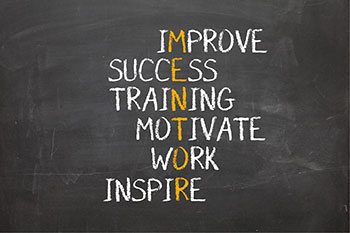Are great leaders born or made? It’s one of those perennial questions that has occupied the minds of many a great business thinker. And the consensus seems to be that it’s a bit of both. Many of the best leaders in whatever sphere of life you find them have innate skills and abilities that we associate with strong leadership. It could be courage, honesty and integrity. Or it could be decisiveness and the ability to relate to people and get the best out of them. And while many leaders may naturally have bucket loads of these attributes, it’s also true that many other very successful leaders have spent time cultivating their leadership skills. Furthermore, while most leaders encourage employees to undertake regular continuing professional development, they often neglect to do so for themselves. So, whether you are already an established leader or you are an aspiring one, what can you do to keep your leadership skills sharp? In this post, we present ten easily implemented ways to ensure you continue to be a strong and effective leader in the workplace. Before we get into the detail let’s have a look at what makes a great leader in the first place.
Essential Leadership Skills
There may be slight differences of opinion by researchers over the detail, but there are definitely a number of skills in common. Here’s our take on the top five:
Honesty And Integrity
High ethical standards as well as demonstrating honesty and integrity when making decisions affecting others are the mark of a good leader. Furthermore, strong leaders ensure that team members understand the ethical framework and buy into it.
Good Communication
Strong leaders tend to have an innate ability to get on with people and instinctively know how to get the best out of them. Words like ‘inspirational’ and ‘charismatic’ are often used in this context. However, it’s good communication skills that are at the heart of every great leader. Whether it’s the company mission or a specific project or task, a leader is able to clearly communicate what they want. They use language that the team easily understands. And they ensure everyone is working towards common goals.

Lead By Example
Good leaders act as role models for team members. If you want the team to achieve high-quality results, then the leader has to demonstrate the behaviors needed to get there. Walking the talk and leading by example are important characteristics of successful leaders.
Decisiveness
Procrastination is the enemy of strong leaders. Team members look up to the leader and trust in their judgment. Having the courage to act decisively even in difficult or challenging circumstances is essential to instill confidence in the team. However, this doesn’t mean that leaders should be rigid and inflexible in their approach. In fact, the best leaders know that flexibility is essential to adapt to the inevitable changes that will happen.
Able To Delegate
The final leadership skill is delegation. A leader who clearly demonstrates the skills we have identified above should be able to trust in their team. Delegating tasks to team members is a clear demonstration of that trust and also means that the leader is empowering the team member. This builds a culture of confidence and mutual trust throughout the company which is good for both the team and the organization.
So, when it comes to developing your leadership skills, you may well score highly on some of these key aspects already. However, you may also be comparatively weak in other areas. What can you do to ensure your leadership skills remain sharp? Here are ten easily implemented ideas to get you started.
1. Find A Mentor
 Being a leader can be a lonely occupation. After all the buck stops with you. Mentoring arrangements enable you to learn from the example of others. Mentors can challenge you, support you and provide fresh insights and perspectives. They can also encourage, inspire and validate. In fact, research tells us that 70 percent of businesses that use a mentor survive more than five years, which is double the rate of companies that don’t.
Being a leader can be a lonely occupation. After all the buck stops with you. Mentoring arrangements enable you to learn from the example of others. Mentors can challenge you, support you and provide fresh insights and perspectives. They can also encourage, inspire and validate. In fact, research tells us that 70 percent of businesses that use a mentor survive more than five years, which is double the rate of companies that don’t.
If you don’t know a suitable mentor, then don’t panic. There are lots of organizations out there that can put you in touch with a business mentor including: SCORE, Small Business Development Centers, Women’s Business Centers, or MBDA Business Centers.
2. Improve Your Project Management Skills
Most companies deploy project working to get tasks done. It could be a cross-functional initiative to improve digital marketing throughout the company, or the research and development team delivering an enhanced product. Project management involves mastering a broad range of talents including good communication, time management, risk management, planning, negotiation as well as subject matter or technical expertise.
 However, how can you expect your team members to deliver if your own project management skills are rusty? What’s more, with so many rapidly changing online tools available it’s important to keep your own knowledge and expertise up to date. Take the time out to attend a seminar, webinar or online training course to sharpen your project management skills. After all, modeling the right behaviors and coaching staff members is the best way to raise the standard across the board.
However, how can you expect your team members to deliver if your own project management skills are rusty? What’s more, with so many rapidly changing online tools available it’s important to keep your own knowledge and expertise up to date. Take the time out to attend a seminar, webinar or online training course to sharpen your project management skills. After all, modeling the right behaviors and coaching staff members is the best way to raise the standard across the board.
3. Learn Something New Every Day
The best leaders have a thirst for knowledge and a high level of self-awareness. They understand that learning new information and skills makes them stronger and more effective. For example, a manager may recognize that their public speaking skills are not one of their strengths. However, a great leader will take the initiative and do something about it by enrolling on a public speaking course. Challenging yourself to learn something new every day will help you to stay strong and effective as a leader.
4. Ask Your Team How You Are Doing
 Performance reviews are the standard tool for evaluating, guiding and supporting employees to continuously improve. Leaders too need to be guided and supported on their journey towards continuous improvement and one important way you can do so is by asking team members for feedback. While it may be difficult to admit that we have weaknesses and faults, great leaders know that constructive criticism will help them to develop and improve their leadership skills. 360-degree feedback in which co-workers, team members, and direct reports, as well as customers if appropriate, provide anonymous performance feedback to the leader is one way you can find out how you are doing. The feedback will provide you with valuable insights into how your effectiveness as a leader, and the behaviors you display are perceived by others. And perhaps more importantly, it will provide you with feedback about what you need to work on.
Performance reviews are the standard tool for evaluating, guiding and supporting employees to continuously improve. Leaders too need to be guided and supported on their journey towards continuous improvement and one important way you can do so is by asking team members for feedback. While it may be difficult to admit that we have weaknesses and faults, great leaders know that constructive criticism will help them to develop and improve their leadership skills. 360-degree feedback in which co-workers, team members, and direct reports, as well as customers if appropriate, provide anonymous performance feedback to the leader is one way you can find out how you are doing. The feedback will provide you with valuable insights into how your effectiveness as a leader, and the behaviors you display are perceived by others. And perhaps more importantly, it will provide you with feedback about what you need to work on.
5. Actively Engage With Employees
The best leaders understand that employee engagement is at the heart of successful organizations. Research tells us that businesses which have strong mechanisms for engaging with employees tend to have happier, more productive team members that also stay in the job longer. Recruitment and retention costs are, therefore, minimized as employees buck the trend to change employers regularly. So, if your company has neglected employee engagement, then now is the time to do something about it especially if you want to be a good leader.
Develop two-way conversations with employees through a CEO blog or vlog and invite staff members to comment and share their insights. Canvass employees’ views on a range of work-related issues through staff focus groups or conferences as well as online surveys and polls. Adopt an open-door policy where employees feel as though they can approach you with their concerns and issues. Strong leaders are expert communicators and good listeners. Having employee engagement mechanisms in place will assist you on both counts as well as being good for business too.
6. Offer Rewards And Recognition

Recognizing and rewarding staff members for a job well done is a characteristic of all good leaders. The simple act of taking the time to thank staff for their contributions will pay dividends in the long run as staff will feel more valued and appreciated. It’s not rocket science and yet it’s sometimes overlooked in the busy daily grind of business. Setting up a formal company recognition scheme in which employees are recognized for going above and beyond will reflect positively on you as the leader. What’s more, the rewards on offer don’t have to break the bank. Lunch vouchers, a shout out on the intranet news feed or even a certificate is often all it takes for the employee to feel appreciated and valued.
7. Encourage Team Members To Make Contributions
 Great leaders recognize that they don’t have a monopoly on good ideas. In fact, money-saving initiatives, innovations or bright ideas can come from anywhere within the organization. Everyone has a contribution to make and should be allowed to have a voice. Encourage team members to make contributions through team meetings, staff suggestion schemes or a bright ideas box. As well as helping to create a culture of innovation and creativity, you will also find such schemes can deliver real commercial results too.
Great leaders recognize that they don’t have a monopoly on good ideas. In fact, money-saving initiatives, innovations or bright ideas can come from anywhere within the organization. Everyone has a contribution to make and should be allowed to have a voice. Encourage team members to make contributions through team meetings, staff suggestion schemes or a bright ideas box. As well as helping to create a culture of innovation and creativity, you will also find such schemes can deliver real commercial results too.
8. Seek Advice When You Need To
Having the humility to recognize that you don’t know all the answers is a sure sign of a great leader. Such leaders are not afraid to seek the counsel of others, whether it’s internal subject experts or external business coaches or mentors. Agility, flexibility and a willingness to take advice when needed are essential attributes in today’s constantly changing marketplace. Leaders need to master self-awareness and wisdom if they are to successfully lead their organizations.
9. Be A Visible Leader
Leaders that are very visible and walk the talk tend to be more successful than those who hide away in ivory towers. Taking the time to visit different departments, talking to and listening to staff on the frontline will enhance your credibility as a leader. It will make you more approachable and likable. Leading by example in this way will also increase the level of respect employees have for you.
10. Don’t Take Yourself Too Seriously
 A good sense of humor is an essential quality for any leader. Don’t take yourself too seriously. A healthy dose of pragmatic realism and an ability to laugh at yourself will help you to cope with the challenges and stresses of being a great leader.
A good sense of humor is an essential quality for any leader. Don’t take yourself too seriously. A healthy dose of pragmatic realism and an ability to laugh at yourself will help you to cope with the challenges and stresses of being a great leader.
Key Leadership Skills
Whether you subscribe to the view that leaders are born or you believe that they are made, there’s no denying that as with any skill, leaders need to nurture their talents. In today’s fast-paced and rapidly changing markets that’s certainly truer than ever before. Leaders can no longer take their skills for granted. Use the ten easily implemented strategies we have identified here to fine-tune your leadership and keep your skills as sharp as possible.
MyHub Intranet Solutions provides a cloud-based intranet platform that is used by hundreds of businesses of different sizes and in different markets across the globe. Our super easy to set up and manage intranet software can support your leadership in a number of important ways from improved internal communications through to effective employee engagement. MyHub intranet comes with a range of powerful business tools and modules that will deliver a range of business benefits as well as supporting your leadership. Take your pick from news feeds and blogs, team and company forums, quizzes and surveys as well as company calendars, file and document storage and collaborative workspaces. Take advantage of our free demo or 14-day no obligation trial and discover for yourself just what a difference the MyHub intranet can make to your leadership and business management.








0 Comments